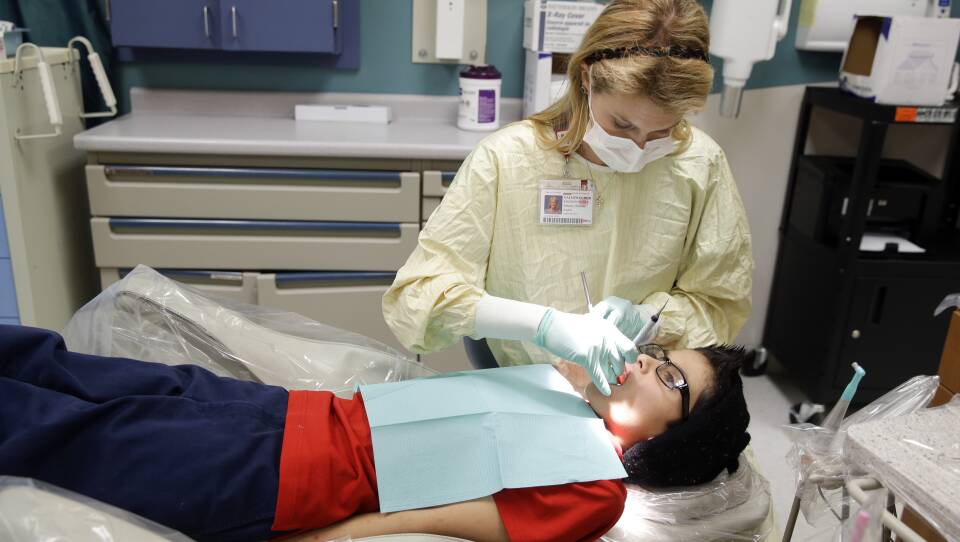Massachusetts has long prided itself as having the smallest portion of children without health insurance of all the U.S. states. But now, it's been knocked off that top spot. According to a new report from Georgetown University, the number of uninsured children in Massachusetts is up for the first time in years. The report says that in 2017, 5,000 children were added to the rolls of the uninsured, bringing the total number to 20,000 children in Massachusetts without health insurance. Suzanne Curry is the associate director of policy and government relations at Health Care for All, an advocacy organization for healthcare. Curry spoke with WGBH All Things Considered anchor Barbara Howard about the new report. This transcript has been edited for clarity.
Barbara Howard: It should be noted that Massachusetts is among the states with the fewest uninsured kids, in relative numbers. The percentage of uninsured children in Massachusetts rose last year from 1 percent to 1.5 percent. That’s still well below the national average of 4.6 percent. But, still, it's an upward trend, and that's troubling to the Georgetown researchers. What would you attribute that spike to?
Suzanne Curry: Part of what the Georgetown report points to is some confusion and fear among families. Particularly during the year 2017, there was a lot of confusion around what is happening with the Affordable Care Act. Is Congress going to repeal it? Is Medicaid going to be decimated? What about the Children's Health Insurance Program? Will that funding continue? Further, there's been a lot of rhetoric and other policy changes on the immigration front, and I will note that the report does also say that one quarter of children under 18 in the U.S. has one parent who's an immigrant. I think that could cause a lot of fear and potentially a chilling effect for families who want to enroll in coverage.
Howard: In fact, just this past Tuesday, there was a protest including doctors at Brigham and Women's Hospital in Boston.
We spoke with one of the doctors who talked to the crowd, and he told the story of seeing patients at his clinic who are making tough choices. These are immigrant patients who are deciding whether or not to be treated. They’re afraid to accept benefits like Medicaid because of the new rule that's been proposed by the Trump administration.
"The woman who's currently pregnant is trying to decide whether or not she wants to stay receiving supplemental nutrition for her and her unborn child," said Douglas Jacobs, an internist at Brigham and Women's Hospital. "The patient with cancer, he has to make the decision as to whether he wants to continue to receive treatment for his deadly illness."
Howard: Can you talk about this new rule that's being proposed, called the "public charge" rule?
Curry: The public charge rule is out for public comment right now until next Monday, so it is a proposed rule. So first off, I just want to say that. It's proposed — nothing has changed right now with adjustment of immigration status.
This would affect people who are looking to adjust their lawfully present status from, say, an employment authorization or some other sort of authorization in the United States to getting a green card, a lawful permanent resident.
Howard: Well let me understand that. What you're saying is if a person accepts public aid, that would count against them if they're going for a green card?
Curry: Yes, it's one of many factors that could determine whether or not they are allowed either admissibility to the country or adjustment of status to get a green card.
Howard: So to avoid being flagged, they'd rather just not take any benefits, and that way hopefully get their green card. Is that what you're saying?
Curry: Yes, and that's part of the chilling effect. Even people who are eligible for these benefits — for Medicaid, for nutrition assistance through SNAP or food stamps, for housing assistance — may be forgoing these benefits because they're afraid of the consequences for their immigration status.
Howard: Have you see any drop in health coverage for the kids? Does it translate into kids not having their checkups, or getting immunizations, things like that? Have you seen that?
Curry: We have heard from health care providers who directly serve patients, like the doctor you were talking about previously, who have seen a drop in people coming in for services. We do, however, operate a help line where we help people connect to health coverage. We've had instances in the past year where we've had people call when they want to drop coverage, even though this proposed rule wouldn't even apply to them.
Howard: So the Georgetown study and the spike in uninsured children in Massachusetts — you attribute that, in part, to these new rules that might affect immigrants?
Curry: We have heard that people are scared and they do want to drop coverage, even people who wouldn't be affected by this proposed rule.
Howard: As a health care advocacy organization, what are you doing on the ground to try to reverse this trend?
Curry: Part of what we're doing is we're trying to educate people about the facts, about the fact that this is a proposed rule, and whether or not they could be potentially impacted by the rule, and try to let people know that it's OK to continue to enroll in benefits at this time.
Howard: That's Suzanne Curry, associate director of policy and government relations at Health Care for All, a health care advocacy organization. This is WGBH’s All Things Considered.




